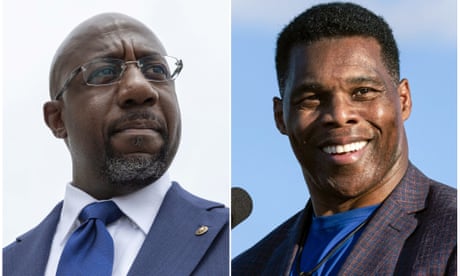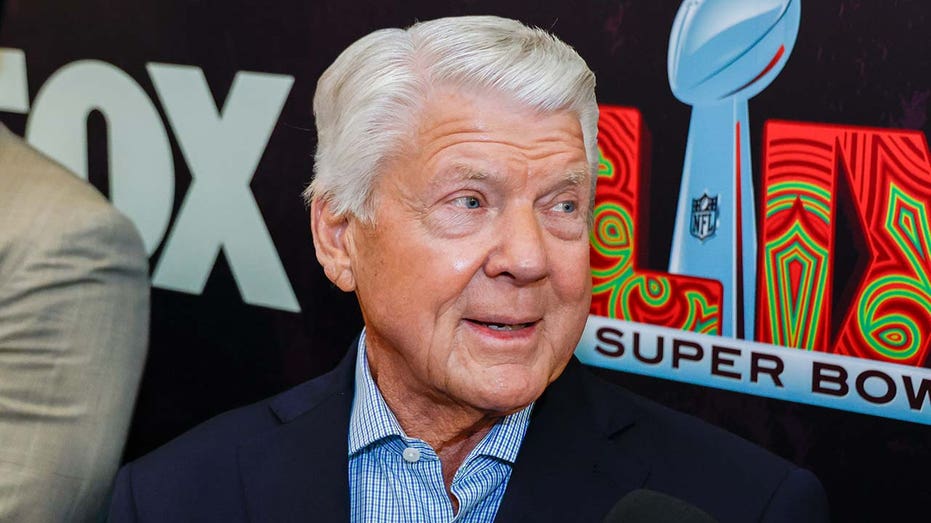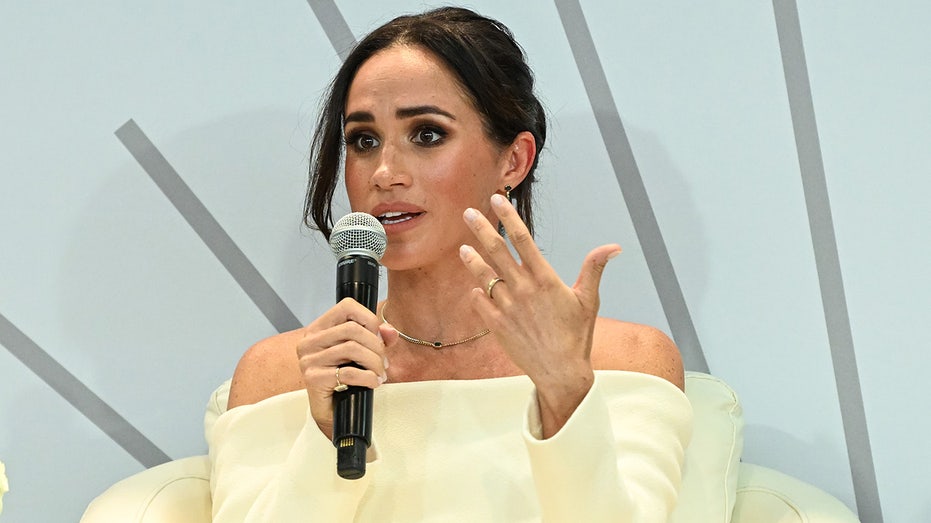- by foxnews
- 04 Mar 2025
Georgia candidates’ starkly divergent views on race could be key in runoff
Georgia candidates’ starkly divergent views on race could be key in runoff
- by theguardian
- 04 Dec 2022
- in news

As senator Raphael Warnock faces off against Republican challenger Herschel Walker in the most expensive race of the 2022 midterms, they also encounter a historic moment: it's the first time in modern Georgia history that two Black candidates were nominated by both parties' voters to vie for a US Senate seat in the deep south state.
Warnock and Walker both had experiences with poverty and Christianity during their upbringings yet their views on race and racism in society are now in stark contrast.
In campaign speeches and previous remarks, Walker, who has been endorsed by former president Donald Trump, has argued racism in America doesn't exist, asking supporters at an event earlier this year: "Where is this racism thing coming from?" Warnock, meanwhile, has spent years decrying racism, including lambasting Republican efforts at voting restrictions on the Senate floor as "Jim Crow in new clothes".
Political scientists and historians say that the contrasting views - Walker's belief of an America "full of generous people" without racism, as he declared in one ad; Warnock's belief in America dealing with racism as an "old sin" - influence how voters, specifically Black voters, will turn out and who they will support.
Exit polling from November's race showed that Black, Latino and Asian voters supported Warnock while Walker captured 70% of white voters.
"When Walker is talking about racism doesn't exist any more, for most Black people, that's a non-starter," said Andra Gillespie, associate professor of politics at Emory University. "On top of it, they look at his lack of qualifications. That is what would give them pause to say that they just put up any old Black person to try to run to this office. He was famous. That could be perceived as a sign of disrespect."
Gillespie says that the racial split in voting "maps on to party identification in the state" - meaning that in Georgia, those who align with the Republican and Democratic parties are "racially polarized". She noted that Walker's messaging tactics during the campaign to decry "woke" culture and arguing Warnock believes America is a "bad country full of racist people" shows he isn't talking to Black voters, an influential voting bloc in a state that's 30% Black.
"When Walker uses Republican talking points and wants to talk about Democrats being divisive when talking about race, he is also signalling to white supporters that he's not going to upset the applecart if you will," she said. "The hope is that by hitting on personal issues and saying the same things that other folks would say, you hope to engage and mobilize and excite his supporters, the majority of whom are white."
Warnock and Walker's life experiences shaped their views on race. Long before he became the senior pastor at Dr Martin Luther King's Ebenezer Baptist church, Warnock grew up in a public housing complex in Savannah, Georgia, and immersed himself at a young age in the speeches of civil rights figures at his local library. Warnock eventually graduated from Morehouse College, a historically Black institution in Atlanta, in 1991.
Before he became a wildly popular running back at the University of Georgia, Walker, who grew up in Wrightsville, more than 140 miles south-east of Atlanta, defied pleas from civil rights leaders who called for him to join racial justice protests in his community in 1980, which saw a group of whites beat Black protesters at the local courthouse, among other acts of racist violence. Walker chose not to get involved.
Leah Wright Rigueur, a political historian at Johns Hopkins University, said Walker and Warnock's contrasting views reflect "a common experience for those coming out of the immediate civil rights era: you either put your head down and shut up or you speak out and you fight".
Even so, Walker's denial of racism does not reflect what a majority of even Black conservatives believe: a recent Pew Research Center study found that more than half of Black conservatives saw racism and police brutality as "extremely big problems" for Black people in the US. In her book The Loneliness of the Black Republican, Rigueur noted that research found that even conservative Black voters would not support candidates who they believe did not have their best interests at heart.
Rigueur argues that the Republican party's choice to back Walker, whose views are in contrast to even a majority of Black Republicans, represents an attempt to "pull a higher number of Black voters and/or disrupt the solidarity that was coalescing around Warnock".
"Walker does none of the things required to garner Black support: he's not well-spoken, not well-versed in policy. He denies racism is an issue. He marches in lockstep with whatever the party line is," she said, adding that Walker had alienated some white voters as well, particularly white women, who typically vote Republican.
The scandals surrounding him, including that he paid for abortions for women, dismantle the "veneer of respectability of what it means to be a Republican", Rigueur said. His lack of outreach and his decision not to campaign over Thanksgiving during a crucial early voting period, paired with his denial of racism's existence, also relegates potential Black voters, who Republicans need to win in a changing electorate like Georgia. Rigueur added: "There has been no indication that he respects Black voters or that he actually is interested.
"He is precisely the kind of candidate you don't want to run in a place like Georgia," she added. "You can no longer delude yourself or the public of these ideas that he's a hometown hero with great conservative values and happens to be Black. You can't buy into any of those things because he doesn't live it and practice it."
What's unique in the Warnock and Walker case isn't so much that two Black men are facing off. That often happens in mayoral and state elections, and even at the federal level, just six years ago, South Carolina's Tim Scott won re-election against Thomas Dixon, a Democratic Black pastor from north Charleston.
But in Georgia, where Black voters often overwhelmingly vote Democrat, Warnock's opponent is a Black Republican at a time when a record number of Black Republican candidates - 28 - ran for office during this year's midterms and as there are three Black Republicans in Congress, the most since the Reconstruction era. Historically, when it comes to elections to national office, Black candidates have struggled to obtain the institutional backing from national parties and the financial investment needed to run successful national campaigns, Rigueur said.
Recent efforts from grassroots, Black women-led civil rights groups in Georgia such as the New Georgia Project and Black Voters Matter who have been able to build an influential voting bloc through registration and outreach campaigns but also national investment in Black candidates from donors who see that growing influence.
Republicans' efforts to invest in Black candidates speaks to efforts to persuade a demographically changing electorate but the endorsement of Walker by Donald Trump "doesn't negate the rest" of Trump's "racially divisive presidency" nor does it negate Republican party's "record on race in the last half century", Gillespie said.
"Herschel's African American, yes, he is a revered native son of the state. But he's also really inexperienced," Gillespie said. "He has a lot of political baggage that in an earlier era would have been disqualifying right off the bat. To nominate somebody like that because he shares an identity with the other opponent, to some people, that looks like tokenism. It is something that a lot of voters are going to be turned off by."
Since 1870, just 11 Black Americans have served in the US Senate. If either Warnock or Walker win in Tuesday's runoff, they would join the Democratic senator Cory Booker of New Jersey and Republican senator Tim Scott as the only current Black members of the 100-person US Senate.
"The fact that we've only ever had three at any given point still demonstrates that there's a long way to go in terms of proportional representation by race," Gillespie said.
- by foxnews
- descember 09, 2016
Bus travel sees 'steady growth' as flyers seek alternative transportation
People who ride on airplanes might rely on alternative transportation for a number of reasons. A CEO of a bus travel company shares insights with Fox News Digital.
read more


